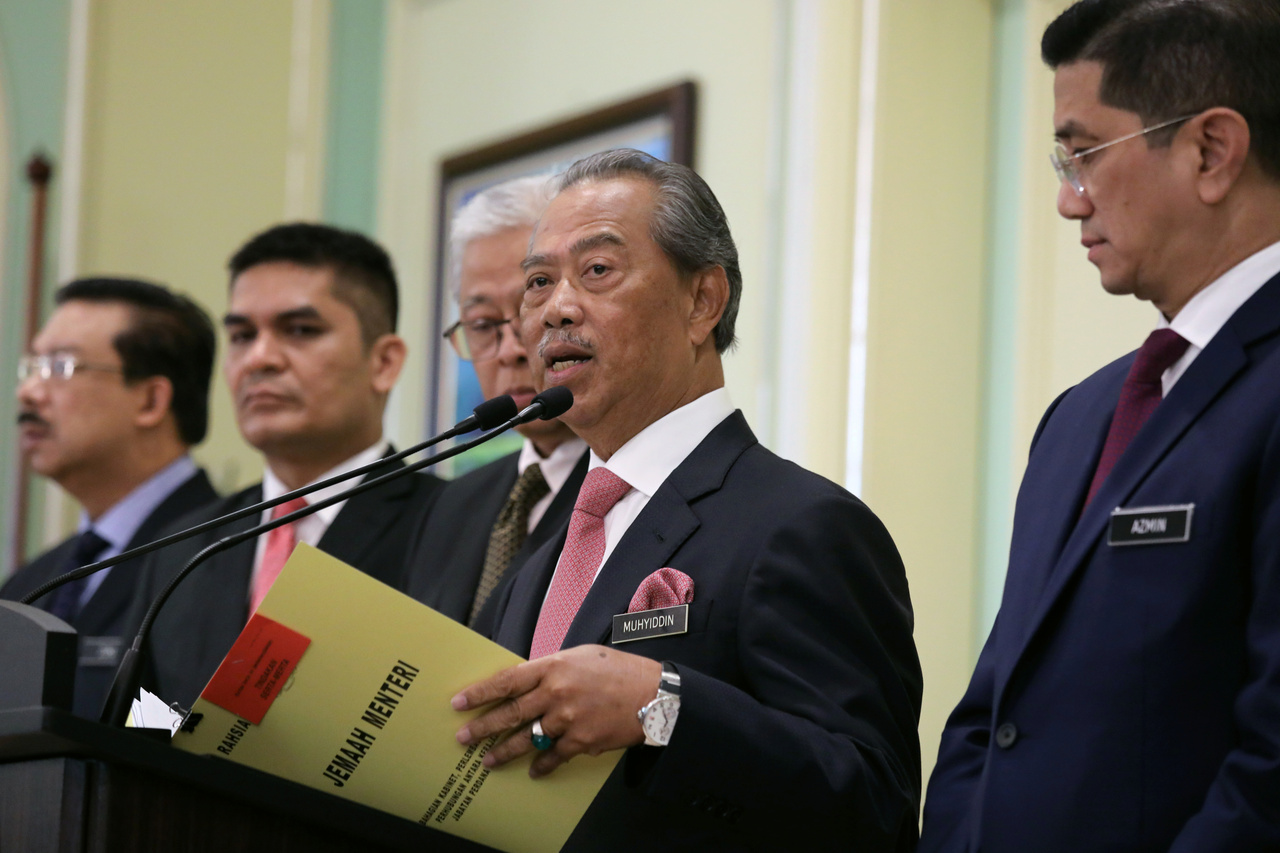Malaysia's ruling Perikatan alliance tightens grip on government agencies
Sign up now: Get insights on the biggest stories in Malaysia

Malaysian Prime Minister Muhyiddin Yassin during a news conference on March 11, 2020.
PHOTO: REUTERS
KUALA LUMPUR - The month-old Perikatan Nasional (PN) government has ordered a swathe of changes at various state agencies in recent weeks, dumping those appointed during the 21 months its predecessor Pakatan Harapan (PH) was in charge.
This comes as the Muhyiddin Yassin-led alliance fights not just the coronavirus crisis, but also for political control having come to power after a week-long saga at the end of February when the outbreak was still in its infancy.
Several sources familiar with these changes told The Straits Times that they were necessary to appease supporters across a wide range of political bases whose factions were not rewarded with ministerial positions. The PN government has taken flak for having 70 as ministers or deputies, far more than the 55 under PH.
"They have to prepare for the Bersatu party election and a confidence vote in Parliament," said a source.
Prime Minister Muhyiddin, the Parti Pribumi Bersatu Malaysia president, is locked in battle for control of the party with former premier Mahathir Mohamad, although the polls have been postponed until after June due to the Covid-19 outbreak.
A parliamentary sitting has also been slated for May 18, and PN leaders will need to ensure their razor-thin majority is maintained or widened after the opposition had claimed to have up to 115 of the 222 federal legislators on their side before Tan Sri Muhyiddin was sworn in as premier on Mar 1.
PN was formed after most Bersatu lawmakers and a faction from Parti Keadilan Rakyat (PKR) united with parties from the Barisan Nasional (BN) coalition that was ousted at the 2018 election, and Islamist outfit PAS.
But the new Cabinet was barely a week old before the government was forced to declare the movement control order (MCO) which has put all non-essential activities in Malaysia at a standstill since March 18.
Many who climbed the ladder of state agencies and government-linked companies during the Najib Razak administration of 2009-2018 are now expected to make a comeback.
Official sources told ST that Khazanah Research Institute (KRI) chairman Nungsari Ahmad Radhi was told to leave the think-tank run by sovereign wealth fund Khazanah after penning an open letter, along with Dr Muhammed Abdul Khalid - economic adviser to former premier Mahathir - criticising the government's approach in handling the coronavirus pandemic.
"It's not so much on the content but who else was related," an internal source said, explaining that Dr Nungsari was sacked not just for the letter, but for aligning with a pro-Mahathir figure as well.
Former economic and finance minister Nor Mohamed Yakcop is being lined up to return to the role he relinquished in 2017 after taking responsibility for the central bank's RM31.5 billion forex losses in the 1990s during a politically-charged Royal Commission of Inquiry on the matter.
ST also understands that Tan Sri Bakke Salleh was asked to vacate the chairmanship of the Malaysian Palm Oil Board (MPOB), in what would be a blow to the Muhyiddin administration's stated commitment to reforms and integrity.
Mr Bakke was one of few figures to emerge from the 1MDB debacle with credibility, having resigned as chairman of the state investment firm after US$700 million (S$1 billion) was diverted from its accounts in the dubious joint-venture with Petrosaudi in 2009.
Neither KRI, Khazanah, MPOB or Plantation Industries and Commodities Minister Khairuddin Razali responded to requests for comment.
On the other hand, Wednesday (April 1) saw the PM and new Finance Minister Tengku Zafrul Abdul Aziz appointed as Khazanah directors, along with Datuk Azlan Hashim, who was part of the en bloc resignation of the sovereign wealth fund's board in 2018 having come under pressure from the Mahathir administration to step down.
Mr Azlan was one of six members of the Retirement Fund (Incorporated) - an asset manager tasked with easing the government's pension burden - investment panel along with then boss of state-controlled Maybank Wahid Omar, who approved RM4 billion (S$1.3 billion) in loans to former 1MDB subsidiary SRC International in 2011 to 2012 amid alleged pressure from then premier Najib.
Datuk Seri Najib is now facing trial over an alleged RM42 million siphoned from SRC, while Tan Sri Wahid resigned as chairman of Permodalan Nasional Berhad - the government-run public savings manager - a month after PH took power.
The same evening on April 1, news broke that the Human Resources Ministry had removed Human Resource Development Fund chairman Noor Farida Mohd Ariffin and five other directors who were appointed by PH to look into alleged abuses under BN.
Prior to the MCO, the Cabinet decided to sack MARA chairman Dr Hasnita Hashim, a respected banker who chairs Maybank's asset management arm, along with an entire council of corporate figures put in place by PH to restructure the agency tasked with aiding the Malay majority and Malaysia's indigenous tribes in business and industry.
It had been mired in questionable dealings under BN when led by Umno MP Annuar Musa, who is now Federal Territories Minister.
Speculation has been rife that former education minister Maszlee Malik, who resigned in January after being asked to step down by then premier Mahathir, will be offered the opportunity to lead MARA to entice him away from the Bersatu chairman's camp.
Mr Muhyiddin is being challenged as president by Kedah chief minister Mukhriz Mahathir, whose father Tun Dr Mahathir was returned as chairman unopposed during nominations last month. The unique party structure divides decision-making power between the chairman and president.


